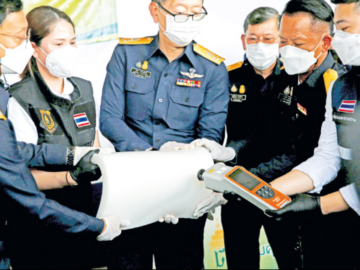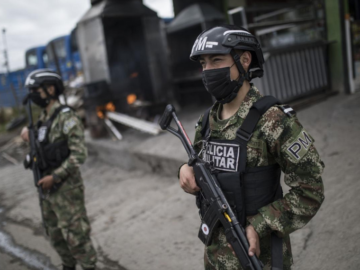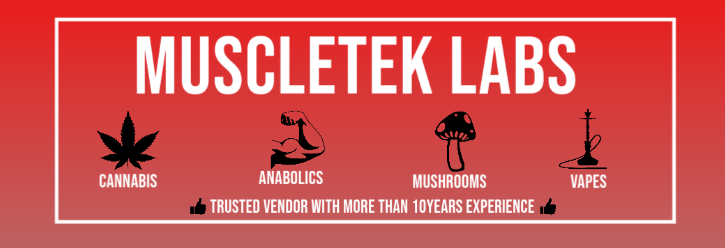No London shooting deaths in six months as police say gun trade stifled
Met says drug gangs in capital finding it difficult to source and move around firearms
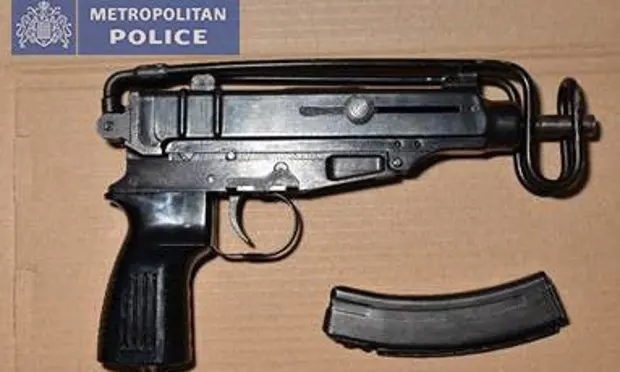
Drug gangs are finding it increasingly difficult to get guns to terrorise rivals and their own members as London approaches six months without anyone being shot dead, Scotland Yard has said.
Metropolitan police chiefs are trying to work out what has led to the fall in gun deaths and gun attacks in the capital. Not since 31 October 2021 has anyone been killed in a shooting on the streets of London. Fifteen people were shot dead in London in 2018, one fewer the year after, and 12 in 2021.
The perception that London’s streets are a wild west of shootouts sits uneasily with the facts, according to the deputy assistant commissioner, Graham McNulty. He said a squeeze by police was making guns increasingly a weapon of last resort for drug gangs.
“We are picking up that urban street gangs and organised crime groups in London are finding it difficult to source and move around firearms,” McNulty said.
It is not just gun deaths that have plummeted. So far this year police have detected 27 shootings in the capital – barely one a week. In 2010-11 there were 499.
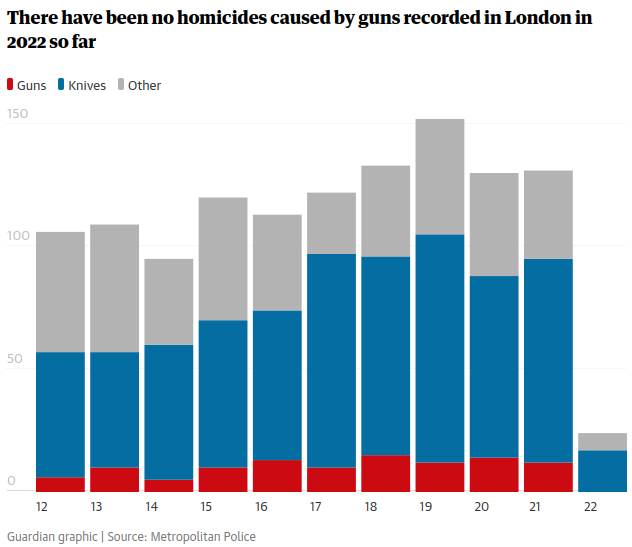
“Gun crime in London is absolutely linked to gangs and drugs and the vast majority of victims and suspects are linked to that world,” McNulty said. Criminals use firearms to protect territory and markets, enforce debt collection, intimidate and frighten people, and as a status symbol.Advertisement
McNulty said: “They are struggling to get lethal weapons and so are having to convert weapons (such as antique weapons and starting pistols) to be lethal … and manufacture the ammunition themselves.”
Long-term reforms to the way Britain’s biggest force tackles gun crime are bearing fruit. Intelligence that previously could sit around while other things were prioritised is instead promoted to the front of the queue and acted upon by special teams as part of Operation Viper, which began in 2016 under the former commissioner Bernard Hogan-Howe.
McNulty said there had been further improvements under Cressida Dick, who formally left the Met on Sunday after her resignation.
A police squeeze on drug networks has benefited the fight against gun crime. Drug trafficking offences such as supply are up, from 2,281 convictions in 2019-20 to 3,720 in 2020-21.
Where once drug supply suspects were having to be bailed for up to 100 days while forensics came back, now samples of suspected illegal narcotics can be tested within four hours and charges brought.
McNulty said this thwarted opportunities for reprisal shootings of foot soldiers in the trade who lost their drugs to the police. “If you are arrested as a drug dealer or mule, they have lost a kilo of drugs and money and they have a problem. If you can arrest, charge and send them to prison, not only can they not deal drugs but the retribution cannot take place.”
Police say intelligence from surveillance and human sources has improved and they are going after suspects for anything they lawfully can.
Most illegal weapons in circulation are handguns, and imports include Brunis from Italy and Retays from Turkey.
Gun crime offenders are mostly 18 to 24 years old and usually have past convictions for violence and drugs. McNulty said: “If you are in this world, you are a target. You may be an offender one day; the next you could be a victim.”
Met chiefs are usually wary of talking publicly about their success on gun crime, partly because a sudden flurry of shootings could make them seem complacent. As one senior Met officer observed, police chiefs can be like politicians and claim credit where the news is good and blame extraneous factors when the news is bad.
Found this interesting? Then check our main news page where you can find all articles related to Crypto, Crime, Darknet, Security and much more!




